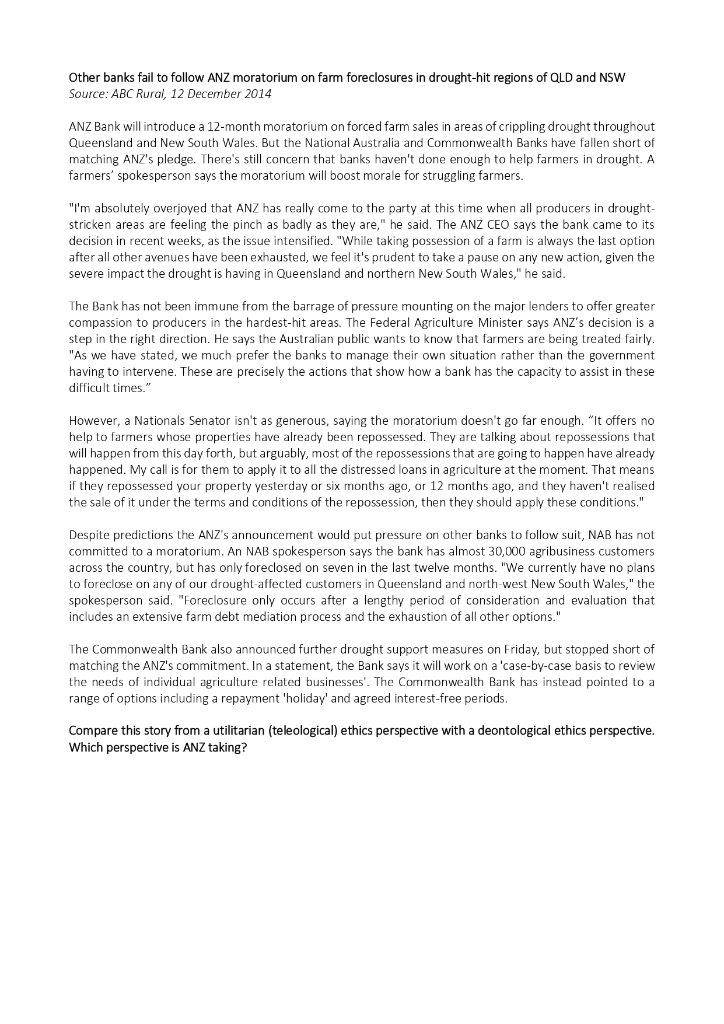In terms of ethical theories, which perspective is ANZ taking?

Other banks fail to follow ANZ moratorium on farm foreclosures in drought-hit regions of QLD and NSW Source: ABC Rural, 12 December 2014 ANZ Bank will introduce a 12-month moratorium on forced farm sales in areas of crippling drought throughout Queensland and New South Wales. But the National Australia and Commonwealth Banks have fallen short of matching ANZ's pledge. There's still concern that banks haven't done enough to help farmers in drought. A farmers' spokesperson says the moratorium will boost morale for struggling farmers. "I'm absolutely overjoyed that ANZ has really come to the party at this time when all producers in drought- stricken areas are feeling the pinch as badly as they are," he said. The ANZ CEO says the bank came to its decision in recent weeks, as the issue intensified. "While taking possession of a farm is always the last option after all other avenues have been exhausted, we feel it's prudent to take a pause on any new action, given the severe impact the drought is having in Queensland and northern New South Wales," he said. The Bank has not been immune from the barrage of pressure mounting the major lenders to offer greater compassion to producers in the hardest-hit areas. The Federal Agriculture Minister says ANZ's decision is a step in the right direction. He says the Australian public wants to know that farmers are being treated fairly. "As we have stated, we much prefer the banks to manage their own situation rather than the government having to intervene. These are precisely the actions that show how a bank has the capacity to assist in these difficult times." However, a Nationals Senator isn't as generous, saying the moratorium doesn't go far enough. "It offers no help to farmers whose properties have already been repossessed. They are talking about repossessions that will happen from this day forth, but arguably, most of the repossessions that are going to happen have already happened. My call is for them to apply it to all the distressed loans in agriculture at the moment. That means if they repossessed your property yesterday or six months ago, or 12 months ago, and they haven't realised the sale of it under the terms and conditions of the repossession, then they should apply these conditions." Despite predictions the ANZ's announcement would put pressure on other banks to follow suit, NAB has not committed to a moratorium. An NAB spokesperson says the bank has almost 30,000 agribusiness customers across the country, but has only foreclosed on seven in the last twelve months. "We currently have no plans to foreclose on any of our drought-affected customers in Queensland and north-west New South Wales," the spokesperson said. "Foreclosure only occurs after a lengthy period of consideration and evaluation that includes an extensive farm debt mediation process and the exhaustion of all other options." The Commonwealth Bank also announced further drought support measures on Friday, but stopped short of matching the ANZ's commitment. In a statement, the Bank says it will work on a 'case-by-case basis to review the needs of individual agriculture related businesses'. The Commonwealth Bank has instead pointed to a range of options including a repayment 'holiday' and agreed interest-free periods. Compare this story from a utilitarian (teleological) ethics perspective with a deontological ethics perspective. Which perspective is ANZ taking? Other banks fail to follow ANZ moratorium on farm foreclosures in drought-hit regions of QLD and NSW Source: ABC Rural, 12 December 2014 ANZ Bank will introduce a 12-month moratorium on forced farm sales in areas of crippling drought throughout Queensland and New South Wales. But the National Australia and Commonwealth Banks have fallen short of matching ANZ's pledge. There's still concern that banks haven't done enough to help farmers in drought. A farmers' spokesperson says the moratorium will boost morale for struggling farmers. "I'm absolutely overjoyed that ANZ has really come to the party at this time when all producers in drought- stricken areas are feeling the pinch as badly as they are," he said. The ANZ CEO says the bank came to its decision in recent weeks, as the issue intensified. "While taking possession of a farm is always the last option after all other avenues have been exhausted, we feel it's prudent to take a pause on any new action, given the severe impact the drought is having in Queensland and northern New South Wales," he said. The Bank has not been immune from the barrage of pressure mounting the major lenders to offer greater compassion to producers in the hardest-hit areas. The Federal Agriculture Minister says ANZ's decision is a step in the right direction. He says the Australian public wants to know that farmers are being treated fairly. "As we have stated, we much prefer the banks to manage their own situation rather than the government having to intervene. These are precisely the actions that show how a bank has the capacity to assist in these difficult times." However, a Nationals Senator isn't as generous, saying the moratorium doesn't go far enough. "It offers no help to farmers whose properties have already been repossessed. They are talking about repossessions that will happen from this day forth, but arguably, most of the repossessions that are going to happen have already happened. My call is for them to apply it to all the distressed loans in agriculture at the moment. That means if they repossessed your property yesterday or six months ago, or 12 months ago, and they haven't realised the sale of it under the terms and conditions of the repossession, then they should apply these conditions." Despite predictions the ANZ's announcement would put pressure on other banks to follow suit, NAB has not committed to a moratorium. An NAB spokesperson says the bank has almost 30,000 agribusiness customers across the country, but has only foreclosed on seven in the last twelve months. "We currently have no plans to foreclose on any of our drought-affected customers in Queensland and north-west New South Wales," the spokesperson said. "Foreclosure only occurs after a lengthy period of consideration and evaluation that includes an extensive farm debt mediation process and the exhaustion of all other options." The Commonwealth Bank also announced further drought support measures on Friday, but stopped short of matching the ANZ's commitment. In a statement, the Bank says it will work on a 'case-by-case basis to review the needs of individual agriculture related businesses'. The Commonwealth Bank has instead pointed to a range of options including a repayment 'holiday' and agreed interest-free periods. Compare this story from a utilitarian (teleological) ethics perspective with a deontological ethics perspective. Which perspective is ANZ taking







